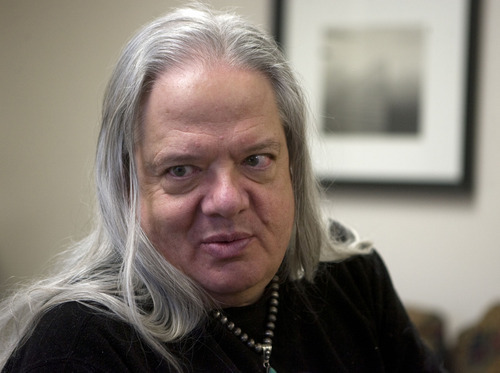This is an archived article that was published on sltrib.com in 2011, and information in the article may be outdated. It is provided only for personal research purposes and may not be reprinted.
An appeals court has upheld a federal law that bans nonmembers of American-Indian tribes from possessing eagle feathers, overturning an earlier court decision that allowed a Utah man to continue using the feathers in his practice of Native American religion.
"The ramifications of that ruling for him are that he'll never be able to have eagle feathers in the future. They are, in fact, the implements of his religion; he doesn't have the ability to fully practice his beliefs," said Joseph Orifici, attorney for Samuel Wilgus Jr. The 65-year-old Wilgus, who was adopted by members of the Paiute Indian Peak Band in southern Utah, has been fighting in court for 13 years to reclaim 141 feathers seized by authorities during a traffic stop in Fillmore.
Orifici said the existing system excludes not just individual believers like Wilgus, but also entire tribes because it relies on the government's historical tribal recognitions.
Wilgus was prosecuted under the Bald And Golden Eagle Protection Act, which allows the possession of feathers only for tribal religious purposes. Feathers are distributed by a national eagle repository in Colorado, and nontribal members are ineligible to apply. Wilgus pleaded guilty to feather possession with the condition that he could appeal, claiming that the tribal membership requirement unnecessarily burdened his free exercise of religion.
In 2009, a U.S. District judge agreed and reversed the conviction. But on Monday, the 10th U.S. Circuit Court of Appeals in Denver overturned the decision and reinstated the conviction, ruling that the government's obligation is to American-Indian tribes and not American-Indian culture in a general sense. The court ruled that reserving feathers for tribal members only is the least restrictive way to protect both eagles and tribal religions.
"The demand for eagle feathers and parts by tribal members ... already greatly outstrips the supply available through the Repository," the opinion states, citing waiting periods of 2 1/2 to 4 1/2 years. "Adding applicants in Wilgus' position would make those wait times longer ... [and] would in fact harm the very population that [the law] was designed to help."
The ruling also argues that allowing all believers to have the feathers would create enforcement problems for wildlife officials.
"If an ... agent catches a suspect in possession of eagle feathers, that suspect can then claim that he is a sincere follower of Native American religion," the opinion states. "The unlucky ... agent would then be cast in the role of 'religion cop' and would be forced to decide whether the suspect is being truthful about his religious beliefs."
Wilgus lived with the Paiute near Cedar City for about seven years as an adult and became "blood brothers" with a spiritual leader in the group, Orifici said. Wilgus was adopted by the mother of his blood brother and for years traveled extensively with the family to religious ceremonies in the Southwest.



